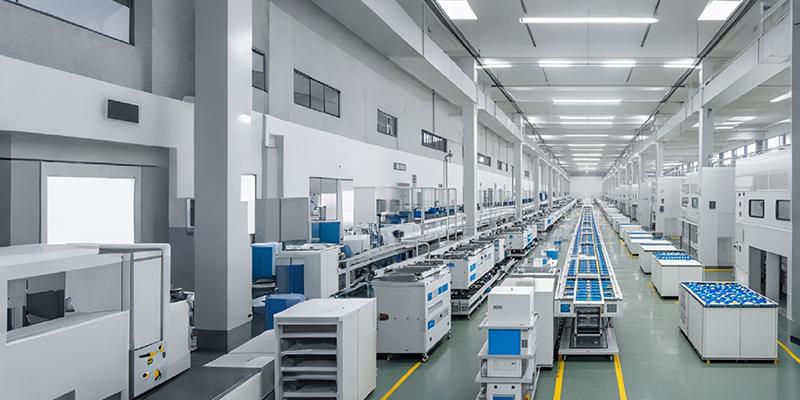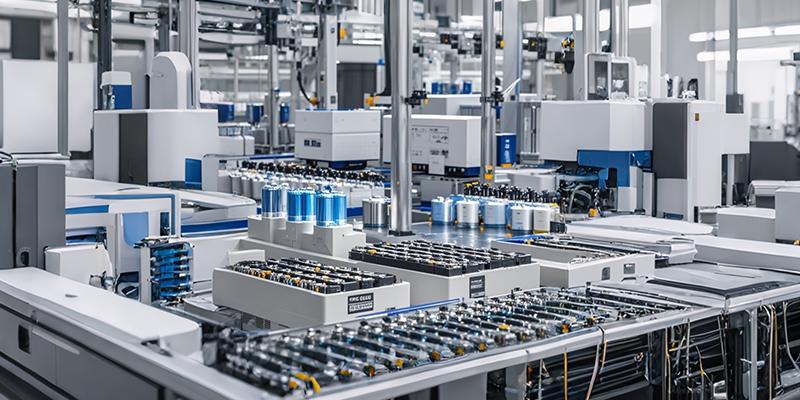Ultimate Guide to Bulk Battery Sourcing in the USA: Top Suppliers and Tips
Introduction
In today’s fast-paced, technology-driven world, batteries play a pivotal role in powering devices across industries. Whether it’s for consumer electronics, medical equipment, industrial machinery, or renewable energy systems, the demand for high-quality batteries is ever-increasing. For businesses looking to source batteries in bulk within the USA, understanding the market landscape, identifying reliable suppliers, and knowing the ins and outs of bulk procurement are crucial steps toward success.
This comprehensive guide aims to equip you with the knowledge needed to navigate the complexities of bulk battery sourcing in the USA. We’ll explore the current market trends, key considerations when purchasing in bulk, introduce top suppliers, and provide practical tips to ensure you make informed decisions that benefit your business.

Understanding the Battery Market in the USA
Market Overview and Trends
The US battery market is one of the largest and most dynamic globally. With the rapid advancement of technology and the push towards electrification, the demand for batteries has soared. Key trends shaping the market include:
- Growth in Electric Vehicles (EVs):The automotive industry’s shift towards electric mobility has significantly increased the demand for high-capacity batteries.
- Renewable Energy Storage:The rise of solar and wind energy solutions has led to a surge in demand for batteries capable of storing large amounts of energy.
- Consumer Electronics Boom:Smartphones, laptops, wearable devices, and IoT gadgets continue to drive the need for compact, efficient batteries.
- Industrial Applications:Industries are increasingly automating processes, requiring reliable battery solutions for uninterrupted operations.
Common Types of Batteries and Their Applications
Understanding the different types of batteries available is essential when sourcing in bulk:
- Lithium-Ion (Li-ion) Batteries:Known for high energy density and longevity, ideal for portable electronics, EVs, and energy storage systems.
- Nickel-Metal Hydride (NiMH) Batteries:Commonly used in hybrid vehicles and some consumer electronics due to their moderate energy density and environmental friendliness.
- Lead-Acid Batteries:Traditionally used in automotive starters and backup power supplies; valued for reliability and cost-effectiveness.
- Lithium Iron Phosphate (LiFePO4) Batteries:A subtype of Li-ion batteries offering enhanced safety and cycle life, suitable for large-scale energy storage and electric vehicles.
- Alkaline Batteries:Widely used in household devices like remote controls and clocks; available in bulk for retail purposes.
Regulations and Standards in the US Market
Compliance with US regulations and standards is non-negotiable:
- Environmental Regulations:The Environmental Protection Agency (EPA) regulates the disposal and recycling of batteries to minimize environmental impact.
- Transportation Regulations:The Department of Transportation (DOT) and the International Air Transport Association (IATA) set guidelines for shipping batteries, especially lithium-based ones, due to safety concerns.
- Safety Standards:Organizations like Underwriters Laboratories (UL) provide safety certifications that are often required for batteries sold in the US.
- RoHS Compliance:Restriction of Hazardous Substances (RoHS) directives limit the use of specific hazardous materials in electrical and electronic products.
Key Considerations for Bulk Battery Purchasing
Quality and Certifications
- Essential Certifications
- Ensuring that the batteries meet industry standards is paramount:
- UL Certification:Indicates compliance with rigorous safety standards.
- CE Marking:Required for products entering the European market but also reflects adherence to essential health and safety requirements.
- RoHS Compliance:Confirms that the batteries are free from certain hazardous substances.
- ISO Certifications:ISO 9001 for quality management systems and ISO 14001 for environmental management systems.
- Quality Control and Testing Standards
- Batch Testing:Regular testing of battery batches to ensure consistency in quality.
- Performance Testing:Verifying that batteries meet the specified capacity, voltage, and cycle life.
- Safety Testing:Includes overcharge, short circuit, and thermal stability tests.
Price and Cost-Effectiveness
- Bulk Discounts and Price Negotiation
- Volume Pricing:Suppliers often offer tiered pricing based on order quantity.
- Negotiation Strategies:Building a relationship with suppliers can lead to better pricing terms.
- Long-Term Contracts:Committing to longer-term agreements may secure more favorable rates.
- Total Cost of Ownership (TCO)
- Initial Purchase Price:The upfront cost of the batteries.
- Maintenance Costs:Consider batteries that require minimal maintenance to reduce long-term expenses.
- Lifespan and Replacement Costs:Longer-lasting batteries may have a higher upfront cost but lower TCO.
Supply Chain and Delivery
- Lead Times and Logistics
- Production Lead Time:The time it takes for the supplier to fulfill your order.
- Shipping Time:Transit times can vary based on shipping method and distance.
- Customs and Import Duties:If sourcing internationally, factor in potential delays and additional costs.
- Inventory Management and Supply Chain Risks
- Stock Levels:Balancing sufficient inventory to meet demand without overstocking.
- Supply Chain Diversification:Mitigating risks by sourcing from multiple suppliers.
- Contingency Planning:Preparing for disruptions due to natural disasters, political instability, or other unforeseen events.
Customer Service and Support
- After-Sales Service
- Warranty Policies:Understanding the terms and duration of warranties.
- Return and Replacement Procedures:Clear processes for handling defective products.
- Customer Support Accessibility:Availability of support channels for prompt assistance.
- Technical Support and Training
- Installation Guidance:Assistance with integrating batteries into your systems.
- Technical Documentation:Access to detailed product specifications and manuals.
- Training Programs:Opportunities for your team to learn about product maintenance and best practices.
Top Battery Suppliers in the USA
Supplier A
- Company Overview
- Supplier A is a well-established battery manufacturer specializing in lithium-ion technology. With over 30 years in the industry, they have a reputation for innovation and quality.
- Main Products and Advantages
- Product Range:Offers a wide array of Li-ion batteries suitable for consumer electronics, EVs, and energy storage systems.
- Innovation:Invests heavily in R&D, leading to high energy density and fast-charging capabilities.
- Quality Assurance:Holds certifications like UL, CE, and ISO 9001.
Supplier B
- Company Overview
- Supplier B focuses on lead-acid and AGM (Absorbent Glass Mat) batteries, catering primarily to industrial and automotive sectors.
- Main Products and Advantages
- Product Durability:Known for robust batteries that perform reliably in harsh conditions.
- Cost-Effectiveness:Offers competitive pricing, especially for bulk orders.
- Customer Service:Provides extensive after-sales support and technical assistance.
Supplier C
- Company Overview
- Supplier C is a leading provider of NiMH and LiFePO4 batteries, with a commitment to sustainability and environmentally friendly practices.
- Main Products and Advantages
- Eco-Friendly Solutions:Emphasizes recyclable materials and green manufacturing processes.
- Custom Solutions:Offers customization to meet specific client needs.
- Global Reach:Has distribution centers across the US, ensuring timely delivery.
How to Choose the Right Supplier
- Assess Your Needs:Match suppliers’ strengths to your specific requirements.
- Verify Credentials:Check certifications and compliance with regulations.
- Request References:Speak with other clients to gauge satisfaction levels.
- Evaluate Communication:Ensure the supplier is responsive and transparent.
Practical Tips for Bulk Battery Purchasing
Research and Comparison
- Evaluating Suppliers
- Company Reputation:Research online reviews, industry reports, and customer testimonials.
- Financial Stability:A financially stable supplier is less likely to have disruptions.
- Manufacturing Capabilities:Ensure the supplier can meet your volume and quality requirements.
- Obtaining Quotes and Samples
- Request Detailed Quotes:Ensure all costs are transparent, including any hidden fees.
- Order Samples:Test products for performance and compatibility before committing to large orders.
- Pilot Orders:Consider placing a smaller initial order to assess the supplier’s reliability.
Contracts and Agreements
- Key Terms and Conditions
- Payment Terms:Understand deposit requirements and payment schedules.
- Delivery Terms:Clarify shipping responsibilities and timelines.
- Quality Clauses:Include specifications and acceptable quality levels in the contract.
- Legal and Compliance
- Intellectual Property Rights:Protect your designs and proprietary information.
- Dispute Resolution:Agree on mechanisms for resolving conflicts.
- Compliance with Laws:Ensure contracts comply with US laws and regulations.
Building Long-Term Partnerships
- Supplier Relationship Management
- Regular Communication:Maintain open lines of communication for feedback and updates.
- Performance Reviews:Periodically assess supplier performance against agreed metrics.
- Collaboration Opportunities:Explore joint initiatives for mutual benefit.
- Shared Growth and Innovation
- Innovation Partnerships:Work with suppliers on R&D projects.
- Market Insights:Leverage suppliers’ expertise to stay ahead of industry trends.
- Sustainability Initiatives:Partner on programs that promote environmental responsibility.

About Himax Electronics
At Himax Electronics, we understand the complexities of sourcing batteries in bulk and the critical role they play in your business operations. With years of experience in the battery industry, we are committed to providing high-quality, reliable, and cost-effective battery solutions tailored to your needs.
Company Background and History
Founded with a vision to revolutionize the battery supply chain, Himax Electronics has grown into a trusted partner for businesses across various sectors. Our dedication to quality and customer satisfaction has earned us a strong reputation in the market.
Our Expertise in the Battery Industry
- Diverse Product Portfolio:We offer a wide range of batteries, including Li-ion, LiFePO4(LIFEPO4 BATTERY), NiMH, and lead-acid, catering to different applications.
- Customization:Our engineering team works closely with clients to develop custom battery solutions that meet specific requirements.
- Quality Assurance:All our products undergo rigorous testing and comply with international standards such as UL, CE, and RoHS.
Our Advantages: Quality, Service, and Technical Support
- Competitive Pricing:We leverage our extensive network and efficient processes to offer competitive pricing without compromising on quality.
- Exceptional Service:Our customer support team is dedicated to assisting you at every stage, from inquiry to after-sales service.
- Technical Expertise:With a team of experienced engineers, we provide technical support and guidance to ensure seamless integration of our batteries into your systems.
Success Stories and Client Testimonials
- Case Study:We partnered with a renewable energy company to supply LiFePO4 batteries for their off-grid solar installations. Our batteries’ reliability and performance significantly improved their system efficiency and customer satisfaction.
- Client Feedback:“Himax Electronics has been instrumental in our project’s success. Their professionalism and product quality are unmatched.” – Sarah L., Project Manager at GreenTech Solutions.
Contact Information
Ready to take your battery sourcing to the next level? Contact Himax Electronics today to discuss your needs:
- Email:sales@himaxelectronics.com
- Website:himaxelectronics.com
Conclusion
Sourcing batteries in bulk within the USA requires careful consideration of various factors, from understanding market trends to selecting the right supplier. Quality, cost-effectiveness, supply chain reliability, and strong customer support are all critical components of a successful procurement strategy.
By conducting thorough research, engaging with reputable suppliers, and following best practices outlined in this guide, you can secure high-quality batteries that meet your business needs and contribute to your long-term success.
Himax Electronics is here to support you on this journey. With our expertise and commitment to excellence, we offer not just products but solutions that power your growth. Contact us today to learn how we can become your trusted partner in battery sourcing.
o1



